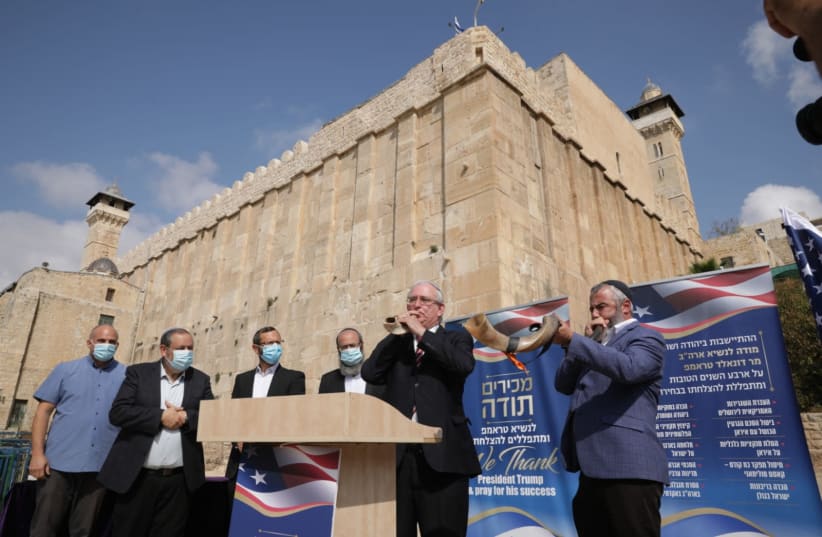The sound of the ram’s horn resounded in front of the Tomb of the Patriarchs in the biblical city of Hebron as settler leaders held a small rally and brief prayer service Monday for US President Donald Trump’s victory in the November 3 election.
“We are people of faith, and here – from the Tomb of the Patriarchs, we pray and express our gratitude to President Trump,” Binyamin Regional Council head Israel Ganz said.
As Ganz spoke, he stood on the stone plaza in front of the King Herod-era structure that housed the tomb of the biblical forefathers and foremothers, including that of Abraham, whose purchase of the site is recorded in Genesis.
The settlers and their right-wing supporters, out of all the Israelis, have the most to gain from a Trump victory.
Among those who stood there were leaders like Ganz and South Hebron Hills Regional Council head Yochai Damri, who opposed Trump’s peace deal with the Palestinians, but have in the last weeks still come out in support of the US president.
Samaria Regional Council head Yossi Dagan, who held a Trump rally in his region of the West Bank last week, was absent.
Both the settlers and Trump support Israeli sovereignty over settlements, but the settlers want a more expanded annexation map and opposed the creation of a Palestinian state, even the demilitarized one part of the Trump plan.
Ganz said he hoped Trump would “be granted additional years as president of the United States, and will strengthen the State of Israel, so that together, we can apply sovereignty in Judea and Samaria.”
He listed the steps Trump had already taken in support of Israel, such as Trump’s “intensive and courageous efforts in transferring the US Embassy to Jerusalem, recognizing the Golan Heights, and the secretary of state’s declaration of the legality of the settlements in Judea and Samaria.”
Damri thanked Trump for his battle against both Iran and the Boycott, Divestment and Sanctions movement.
Hebron Jewish Community spokesman Yishai Fleisher linked the site with Trump’s normalization deals between Israel and its regional Arab neighbors, known as the Abraham Accords.
“The Abraham Accords, which were signed between Israel, Bahrain and the United Arab Emirates, and other countries coming soon, is part of the great vision of President Trump, and we thought there would be no more perfect a place than to come here and to give honor to President Trump and to wish him well.”
Gush Etzion Regional Council head Shlomo Neeman recalled the eight bitter years of the Obama administration, which had attempted to freeze settlement activity.
“We couldn’t even build a nursery for children or lay a sewer line,” he said.
Trump, in contrast, has proven his devotion to the settlements, Neeman said.
Kiryat Arba Council head Eliyahu Liebman said “support for Trump” was akin to “support for God,” adding, “we are all praying for his victory.”
Efrat Council head Oded Revivi, who supports Trump and his Peace to Prosperity plan, opposed the decision of the settler leaders to hold the event, noting that Israeli politicians should not involve themselves in US politics.
“Responsible Israeli leaders should avoid entanglement in foreign elections, in the same way that we demand that foreign nations respect our democratic processes,” Revivi said. “It is the duty of Israeli leaders to work with all of our allies regardless of who their citizens choose to lead their country.”
The settler leaders at the rally would have done better to simply pray that “the result of the US elections will lead to a stronger Israel and strengthened US-Israel relationship,” Revivi said. “We must remember that ultimately it is up to us Israelis to advance Israel’s interests regardless of who is the US president. We have seen too often Israeli leaders reject policies that would have benefited Israel and in other times, have embraced policies that damaged Israel.”
He added that it was hypocritical for leaders who had fought Trump over his peace plan to now pray for his victory. It might be “wiser” for them to pray now for the “wisdom that eluded them when they opposed this administration just a few months ago.”
